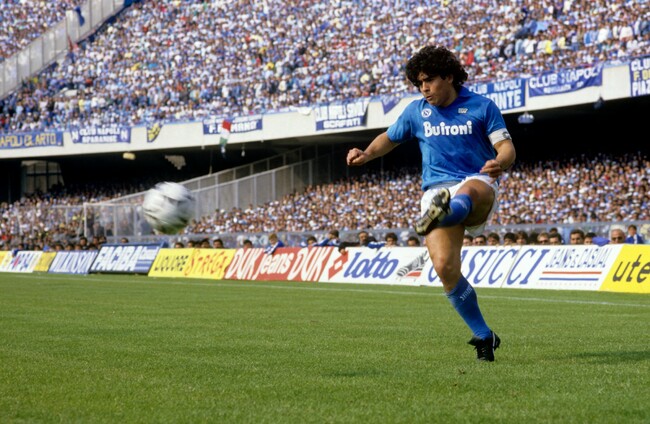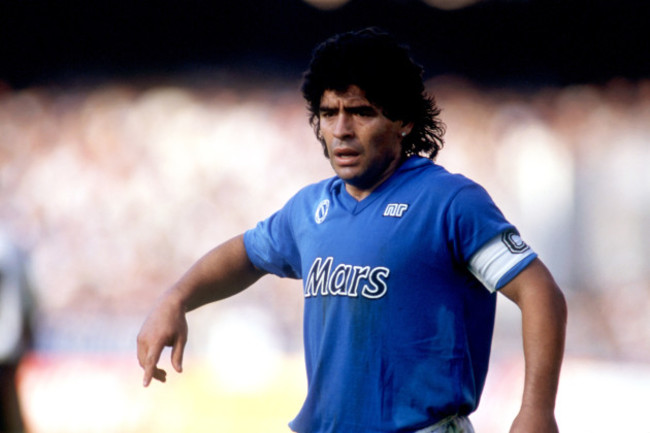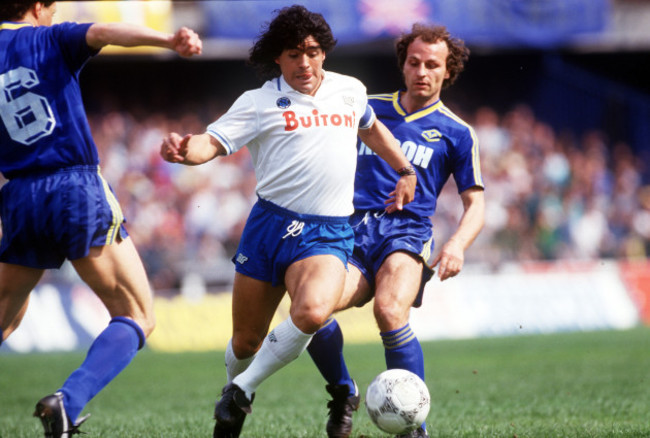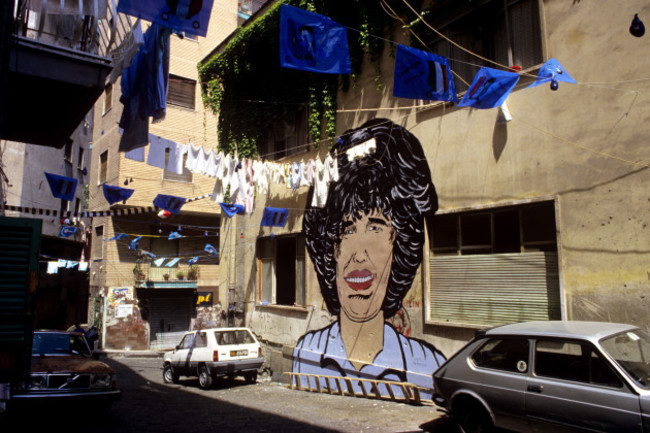THERE’S A NEAPOLITAN phrase – A carta vicino ‘o fuoco s’appiccia – which literally means that paper close to a fire will inevitably go up in flames.
Of course, Diego Maradona’s seven-year stint with Napoli did end tumultuously but amidst the cocaine and the mafia and the bastard son, there was a multitude of success too.
The city of Naples – gritty, tough, uncompromising – was and very much remains his spiritual home. He fled, in disgrace, 26 years ago but earlier this week, at a glitzy ceremony where he was granted honorary citizenship of the city, it was like he had never left.
It’s understandable.
Maradona, after all, gave Napoli immortality.
He arrived in 1984 having tired of the endless kickings he received on the pitches around Spain. Memorably, his last appearance for Barcelona came in the Copa del Rey final against Athletic Club – the league champions – which culminated in a post-game free-for-all at the Santiago Bernabeu after Maradona retaliated to some verbal abuse with physical retribution.
With relations already strained between him and the club on account of his injury problems and the team’s on-field struggles, there was certainly no going back after such a high-profile humiliation for Barcelona – football’s most expensive signing and marquee name instigating a mass brawl in front of the King of Spain and millions of TV viewers.
When Maradona touched down in Naples for another world record amount (£5m is the oft-quoted figure but in his superb biography of Maradona, Hand of God, author Jimmy Burns says it was, in fact, double that amount), it was treated like the Second Coming of Christ.
But Maradona would not just resurrect himself but, instead, an entire community. His signing became a symbol. Treated with disrespect and contempt by those in the north of the country, Naples was seen as the runt of the litter. To many in Italy it was a seedy, grim, unforgiving place. While it was left in the shadows in terms of politics and economics, it had struggled to compete on the football pitch also. Prior to Maradona’s arrival in 1984, nine of the previous 10 championships had been won by teams based in just two cities – Milan and Turin.
So, even when there were whispers about a possible deal for Maradona, supporters couldn’t contain their level of excitement and anticipation. It would send a message to the rest of Italy.
When Barcelona demanded an extra couple of hundred grand during negotiations, thousands of local fans turned up a Naples’ building city to hand over their contribution to the pot. Within a day, the money was raised and not long after Maradona was unveiled.
Still, his time with Napoli is largely associated with the Camorra – the city’s mafia organisation. They were intrigued by what Maradona’s signing could do for them: an increase in ticket sales (60,000 season tickets were sold for Maradona’s debut campaign) would see exponential growth in touting – a staple of the Camorra diet while there was also the economic value of Maradona coming to Naples and how it affected the Camorra’s other interests. Finally, they also took control of Maradona-related merchandise in the city. According to Burns, they made Maradona’s agent, Jorge Cyterszpiler ‘an offer he couldn’t refuse’.
In many ways, it was an atmosphere that Maradona revelled in. In many ways, he saw the local gangsters as mirror images of himself. They had come from humble beginnings and graduated to positions of influence and power. They were rich and enjoyed nice things. Maradona slotted in quite effortlessly.
And, relatively quickly, he found his feet on the pitch too. There was an eighth-place finish in 1985 but Maradona still managed 14 goals and Napoli were only 10 points from unfashionable champions Hellas Verona. The following season they were better and finished third. Maradona hit double-figures again before heading to Mexico and captaining Argentina to World Cup success.
This was him in his pomp.
There is a neat geographical metaphor regarding Naples’ vicinity to Mount Vesuvius. Locals get a daily reminder of the threat – however inexplicable – of eruption and the possibility of destruction. Maradona is the personification of that. But, like the Camorra example, he seemed to take great comfort from the chaos, like it was reassuring. If things were quiet for too long, Maradona would get suspicious. The cyclical explosions became normal.
So, as he excelled with Napoli, his private life was in disarray. His marriage to childhood sweetheart Claudia was falling apart and for a four-month period between December 1985 and March 1986, he’d had a fling with a 20-year-old local woman named Cristiana Sinagra.
But when she became pregnant with his child, everything changed. The relationship ended, Maradona ignored his responsibilities, concentrated on the World Cup preparations and gleefully repaired things with Claudia.
The child – a son- was born in September 1986 and Cristiana called him Diego Armando after his father. Quickly, the media latched onto the story and Cristiana was open with the press. She had nothing to hide and had been shunned by Maradona. Publicly, he lied, believing ignorance would be bliss.
“About this I know nothing – absolutely nothing,” he said.
It would take five long years and a legal case for Maradona to change his tune.
By that stage, he had been forced into exile and his time with Napoli had come to an end owing to a 14-month suspended sentence for cocaine possession. Simultaneously, he had been banned from football for 15 months and both his professional and personal lives were in free-fall.
Still, if the paper ultimately went up in flames, Maradona had exceeded expectations in Naples.
1987 was the beginning of an unprecedented period of dominance for the club. Maradona scored 10 times as Napoli lost just two games in the entire league season to be crowned Italian champions for the very first time. They had already claimed a Coppa Italia and the celebrations were like nothing the city had ever seen.
Everything stopped for a week as people partied in the streets. Sleep was negotiable. Perhaps no one really wanted to wake up from the dream.
Least of all Maradona himself.
The42 is on Instagram! Tap the button below on your phone to follow us!














Had Scott 50/1 and he misses that absolute sitter. Week off too a serious start
100%